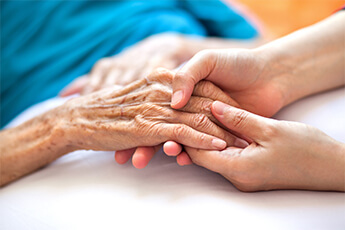Kidney and bladder cancer: A patients' guide

It is extremely uncommon, but possible, for a patient to have kidney and bladder cancer at the same time. In some cases, cancer can begin in the kidney and spread to the bladder, or vice versa.
In this guide, you'll learn about the relationship between kidney and bladder cancer, symptoms of each type of disease, risk factors, survival rates, treatments, and more, with stories from real patients.
In the Inspire Kidney Cancer Community, members share their personal experiences of living with renal cancer and how to find support. This content should not be used as a substitute for professional medical advice, diagnosis, or treatment. As always, consult with your doctor before trying any new treatments or medications.
Can you have kidney and bladder cancer at the same time?
It's very uncommon to have kidney and bladder cancer at the same time. In rare cases, patients may have two different types of tumors that are detected in the kidney and the bladder, such as renal cell carcinoma (RCC) of the kidney and urothelial cancer of the bladder.
It is possible, but unlikely, for kidney cancer to metastasize (spread) to the bladder. There are also a few documented cases of bladder cancer metastasizing to the kidney, but these cases are also rare.
In patients with upper tract urothelial cancer (UTUC), a rare cancer that affects the renal pelvis (tissue that connects the kidney to the ureter) and ureter (the tube that connects the kidney to the bladder), it is common for tumors to reoccur in the bladder after nephroureterectomy surgery.
A nephroureterectomy is a major surgery that removes the kidney and ureter. The most common reason for a nephroureterectomy is when cancer affects a patient's upper urinary tract. Learn more.
Symptoms of kidney and bladder cancer
In adults, clear cell renal cell carcinoma (ccRCC) is the most prevalent type of kidney cancer, accounting for up to 80% of kidney cancer cases in adults. It's less common in children, and only 2%-6% of children and young adults with kidney cancer have ccRCC.
In young people, a rare form of cancer called Wilms tumor or nephroblastoma accounts for 90% of kidney cancer diagnoses.
Most early cases of ccRCC are without symptoms. When early ccRCC is discovered, it is usually during a routine radiology examination.
The likely symptoms of ccRCC include the following:
blood in urine (hematuria)
back pain
flank mass (a lump in your side)
fatigue
weight loss
anemia
fever
high serum calcium level
If your doctor thinks you may have ccRCC or another type of kidney cancer, they will utilize imaging scans such as X-rays, MRI, or CT to examine the area. Depending on the result, they may order a biopsy to obtain a tissue sample to determine whether you have ccRCC or another form of kidney cancer.
The most common type of bladder cancer is called urothelial bladder cancer, also known as transitional cell bladder cancer. This form of cancer is responsible for approximately 90% of all bladder cancer cases.
The following symptoms can indicate bladder cancer:
visible blood in the urine (hematuria), usually in advanced cases of bladder cancer
microscopic hematuria (blood in the urine that is not visible with the naked eye)
urinary tract infections or obstructions
Other less common symptoms include painful or frequent urination, fatigue, weight loss, or a mass in the pelvic area.
If your doctor suspects you may have bladder cancer, they may order imaging (such as ultrasound, intravenous urography, CT scan, MRI), cystoscopy (a machine-assisted bladder exam), or biopsy to learn more.
Clear cell carcinoma is an uncommon form of cancer that can affect the kidneys and, more rarely, ovaries, uterus, cervix, or the gastrointestinal tract. Learn more.
What causes kidney and bladder cancer?
All cancers originate from out-of-control, mutated cells that multiply and grow at a greater rate than normal, healthy cells. Researchers have identified specific risk factors that appear to contribute to a higher risk of kidney and bladder cancer, including age, genetic disorders, and lifestyle behaviors.
Shared risk factors for kidney and bladder cancer are as follows:
advanced age, with most cases occurring in patients in their 60s or 70s
Lynch syndrome, a genetic disorder that increases the risk of kidney, bladder, and several other cancers
Research suggests the following risk factors increase the odds of having kidney cancer:
being male (men are twice as likely as women to have kidney cancer)
high body fat levels or obesity
low physical activity levels
smoking (15%-30% increased risk)
hypertension (high blood pressure) or chronic kidney disease
type 2 diabetes
von Hippel-Lindau syndrome, a rare genetic disorder that increases the risk of kidney cancer and other cancers
Known risk factors for bladder cancer include the following:
smoking (two- to six-fold higher risk compared to non-smokers)
schistosomiasis infection (a parasite found in some tropical and subtropical countries)
occupational exposure to chemicals, including paint, rubber, petroleum products, and dyes
You can reduce your risk of both kidney and bladder cancer by maintaining a healthy weight, being physically active, and quitting smoking.
Ureter cancer is a rare category of cancer that affects the ureters (long, thin tubes connecting the kidneys and bladder) or renal pelvis (a funnel-like structure that connects the kidney to the ureter). Learn more.
What is the prognosis of kidney and bladder cancer?
Most types of kidney cancer and bladder cancer have high survival rates when they are diagnosed early. However, the overall survival rate for both types of cancer is poor because they are usually detected at an advanced stage.
A study of kidney cancer patients found the following five-year survival rates:
88% for stage I cancer
63% for stage II cancer
65% for stage III cancer
15% for stage IV cancer
Kidney cancer stages are based on the size of the primary tumor that exists in the kidney, and stage IV kidney cancer is metastatic, meaning it has spread to other areas.
And according to a separate study of bladder cancer patients, five-year survival rates were as follows:
98% for stage Ta (noninvasive papillary carcinoma)
90% for stage Tis (noninvasive flat carcinoma)
85% for stage I
45% for stage II
35% at stage III
7% at stage IV
Early-stage bladder cancer refers to superficial cancer that affects the surfaces of bladder cells, while higher stages also affect surrounding muscles and are more likely to metastasize (spread) to distant areas.
Kidney and bladder cancer treatments
Appropriate treatment for kidney or bladder cancer can vary depending on the location of tumors, the grade of cancer, and whether or not the cancer has metastasized (spread to other areas).
The available treatments for kidney cancer include the following:
surgery to remove the cancer and sometimes surrounding tissues
chemotherapy, which kills fast-growing cells, including cancer cells
immunotherapy to help your immune system destroy cancer cells
targeted therapy that affects cancer cells' ability to grow, divide, and spread
radiation therapy to kill tumor cells
thermal ablation using heat to kill cancer cells
cryosurgery, which uses liquid nitrogen to freeze and kill tumor cells
The appropriate treatment for bladder cancer varies depending on the tumor stage and other individual patient factors, as described below:
For early-stage bladder cancer, most patients require resectioning surgery with immunotherapy and chemotherapy.
For later-stage bladder cancer, patients usually undergo radical cystectomy (bladder removal) with chemotherapy.
Some patients with late-stage bladder cancer achieve beneficial results with resectioning of the ureter, chemotherapy, and radiation therapy.
Advanced, metastatic bladder cancer appears to respond best to systemic cisplatin-based chemotherapy.
In patients who do not respond well to chemotherapy, immunotherapy is generally more effective.
Immunotherapy uses your immune system to fight cancer. Immunotherapy drugs take advantage of naturally occurring molecules found in cancer cells, called tumor antigens, to target cancer cells and attempt to kill or limit them with your body's immune system. Learn more about immunotherapy.
Patient stories of living with kidney or bladder cancer
Bloody urine is frequently a sign of kidney or bladder cancer:
“I am very newly diagnosed with bladder cancer. I went to the ER 6 months ago after an episode of visible blood in my urine. They ruled out infection and discharged me with a dehydration diagnosis due to my property mowing activities. I was not aware at that time of what I believe to be the protocol, which is, blood in urine, no infection with no pain, go straight to urologist with cystoscopy, etc., to rule out bladder cancer. I then had had bloody urine once again, and I insisted that my family doctor send me for a urology referral.” Go to post
Rarely, cancer that begins in the kidney can spread to the bladder:
“They removed my kidney to get the cancer. Meanwhile the cancer seeded into my ureter and bladder, and ten months later I lost that as well. The good news is the cancer hasn't recurred.” Go to post
Transitional cell cancer (TCC), also called urothelial cell cancer (UCC), can affect the kidney, ureter, or bladder:
“When my husband first had blood in his urine, he had a scan that showed a tumor in his kidney. We thought this form of cancer affected the bladder, but he was diagnosed with TCC (or UCC) of the right renal pelvis about a year ago. He is not a candidate for either surgical removal of the kidney/ureter or BCG vaccine, so we have followed other routes. Lots of cutting and burning and mitomycin.” Go to post
Pain management can be challenging with kidney cancer, or any type of cancer:
"I have been recently diagnosed with clear cell renal carcinoma that has spread to my right lung and right breast....I have not started treatment yet. But I am in a great deal of pain in my upper back which they say is due to the mass in the lung. I am doing acupuncture and pain meds. But neither work entirely." Go to post
Want to connect with other people living with kidney cancer and their caregivers today? Visit the Inspire Kidney Cancer Community.
Sources
https://medlineplus.gov/genetics/condition/von-hippel-lindau-syndrome/
https://www.cancer.net/cancer-types/bladder-cancer/stages-and-grades
Disclaimer
Member comments have been lightly edited for length and clarity. This content is for general informational purposes only and does not necessarily reflect the views and opinions of any organization or individual. The content should not be used as a substitute for professional medical advice, diagnosis, or treatment. Please consult your healthcare provider about any questions you may have regarding a medical condition.




